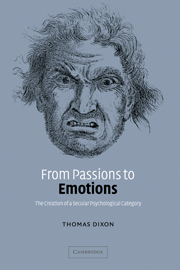Book contents
- Frontmatter
- Contents
- Acknowledgments
- Note on quotations
- 1 Introduction: from passions and affections to emotions
- 2 Passions and affections in Augustine and Aquinas
- 3 From movements to mechanisms: passions, sentiments and affections in the Age of Reason
- 4 The Scottish creation of ‘the emotions’: David Hume, Thomas Brown, Thomas Chalmers
- 5 The physicalist appropriation of Brownian emotions: Alexander Bain, Herbert Spencer, Charles Darwin
- 6 Christian and theistic responses to the new physicalist emotions paradigm
- 7 What was an emotion in 1884? William James and his critics
- 8 Conclusions: how history can help us think about ‘the emotions’
- Bibliography
- Index
5 - The physicalist appropriation of Brownian emotions: Alexander Bain, Herbert Spencer, Charles Darwin
Published online by Cambridge University Press: 22 September 2009
- Frontmatter
- Contents
- Acknowledgments
- Note on quotations
- 1 Introduction: from passions and affections to emotions
- 2 Passions and affections in Augustine and Aquinas
- 3 From movements to mechanisms: passions, sentiments and affections in the Age of Reason
- 4 The Scottish creation of ‘the emotions’: David Hume, Thomas Brown, Thomas Chalmers
- 5 The physicalist appropriation of Brownian emotions: Alexander Bain, Herbert Spencer, Charles Darwin
- 6 Christian and theistic responses to the new physicalist emotions paradigm
- 7 What was an emotion in 1884? William James and his critics
- 8 Conclusions: how history can help us think about ‘the emotions’
- Bibliography
- Index
Summary
The influence of Brown's terminology and of his methods and conclusions has been potent in the formation and consolidation of the Associational Psychology – represented by J. Mill, J. S. Mill, Alexander Bain, and Herbert Spencer.
Noah Porter, ‘Philosophy in Great Britain and America’, 410Emotion is the name here used to comprehend all that is understood by feelings, states of feeling, pleasures, pains, passions, sentiments, affections.
Alexander Bain, The Emotions and the Will, 3Physicalist theorists of emotion in Britain 1855–1875
In the intellectual world of the second half of the nineteenth century evolutionary theories were the subjects of endless public and professional disputes. The theory of evolution by natural selection was, however, just one part of a broader set of evolutionary hypotheses, including theories of inheritance of acquired characteristics and sexual selection. These, in turn, were just one part of a coalition of individuals and ideas, which predated the Origin of Species (1859), and which was broadly perceived in Victorian culture as connected not only with science and evolution, but also with ‘materialism’, ‘atheism’, ‘positivism’ and ‘Comtism’. These terms were used loosely, largely inaccurately and almost always pejoratively by those who opposed the inroads being made by secular, evolutionary and physiological thinkers such as Bain, Spencer, Darwin, Huxley and Henry Maudsley into the preserves of the human mind, morality and religion.
- Type
- Chapter
- Information
- From Passions to EmotionsThe Creation of a Secular Psychological Category, pp. 135 - 179Publisher: Cambridge University PressPrint publication year: 2003



